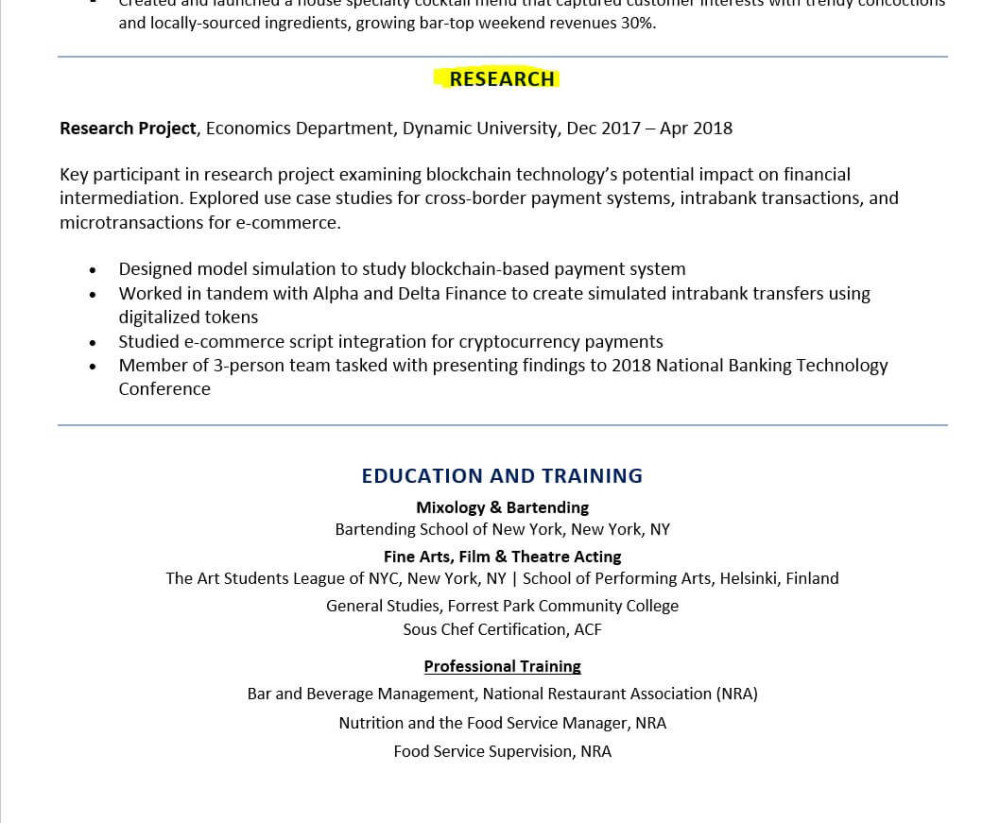Including Research on Your Resume: A Guide

Learn how to incorporate research experience examples on your resume
It’s not just scientists and PhD students who possess research experience examples, you know. Research experience examples are highly prized across a wide spectrum of roles and industries. Researchers, with their logical approach and acute attention to detail, are invaluable to employers. After all, new ideas often spring up following exhaustive analyses of existing practices.
So, is it any surprise that innovative companies around the world look for employees who possess comprehensive research skills?
What exactly are research skills?
Research skills are those talents required to investigate and analyze a subject, and then communicate the findings to others. In short, there’s no easily-defined skill that encompasses all of these qualities. Instead, it’s a combination of abilities to research that involves the effective use of a range of other skills.
Most relate to critical thinking in some way. They involve accumulating information and using it to draw reasoned conclusions. Naturally, these conclusions need to be conveyed to others using effective communication.
The good news is that most people possess at least some skill in researching. However, many jobseekers just don’t recognize that they have these skills or why they matter to employers.
Employers value these skills because they’re essential to progress. Innovation only comes from research and inspired insight. As a result, companies that rely on innovation to remain competitive tend to rely on employees who happen to be talented researchers.
Obviously, there are entire fields of industry that use researchers for that sole purpose. In a more general sense though, research skills are widely used by many different types of employees, and they use them in almost every industry in the marketplace.
In this post, we’ll help you identify your research experience examples, and show you how and where to include them on a resume.
Important research skills you may already possess (without even realizing!)
When listing research experience examples on your resume, it’s important to remember that most of them won’t necessarily be core skills for the job that you’re seeking. Unless you’re applying for a job as a researcher, these skills will be transferable. That means they might not be essential for the position, but will certainly enhance your value as a potential employee.
To better understand your own research skills, it’s important to be able to identify them.
Here are some common and valuable research-related skills that many employees possess. Chances are that you’ve used at least some of these in your career.
For example:
Attention to detail — this seemingly simple skill is one that employers truly appreciate. People who possess an ability to note even the smallest details can be invaluable when identifying problems and creating solutions.
Planning and scheduling — every research project starts with a plan and a schedule. These are also transferable skills that have application throughout almost every industry.
Data collection — top notch research depends on robust data. If you’re a skilled data collector, that talent will be useful for any company’s research needs.
Problem-solving — at some level, research is about resolving problems. Whether it’s a graduate thesis or a corporate study, there’s always a question that needs to be answered.
Technical proficiency — knowing your way around a computer and other technology is an essential skill in modern research.
Critical thinking — data collection is pointless if no one ever considers what that data actually means. That analysis requires critical thinking and the ability to analyze and draw reasonable conclusions.
Project management — can you manage projects in an orderly and effective way? Every research project requires effective management.
Effective communication — whether it’s an oral presentation or a written report, research findings always need to be communicated to others.
How to list research on a resume
For research, summarize your accomplishments in a brief section. You should include a description of your role in the research, the topic that you were exploring, and some information about your findings.
Expert Tip
Include quantifiable data and/or figures to back up your experience and examples as much as you can, as this will evidence what you’ve achieved.
Example 1
Dec 2022 – Apr 2024
Research Assistant, Economics Department, Dynamic University
Key participant in a research project examining the impact of blockchain technology on financial intermediation. Explored case studies on cross-border payment systems, interbank transactions, and microtransactions for e-commerce.
Designed a model simulation to study blockchain-based payment systems.
Worked in tandem with Alpha and Delta Finance to create simulated interbank transfers using digitized tokens.
Studied ecommerce script integration for cryptocurrency payments.
Valued member of a 3-person team tasked with presenting findings at the 2023 National Banking Technology Conference
Example 2
Jan 2023 – Jul 2023
PhD Student, Forestry & Agricultural Institute (FABI), University of South Africa
Focused on a project on the taxonomic identification of pathogens associated with pests on Chinese conifer trees by running DNA sequence analysis. Processed samples of diseased trees from different parts of South Africa in the diagnostic clinic, and identified pests and diseases using microscope and molecular techniques. Delivered a comprehensive final report with recommendations to clients.
Key Achievements
Published three research papers in peer-reviewed journals, including Fungal Diversity and the Pest Control Journal.
Presented scientific research at various conferences.
Published posters to aid further scientific discussion.
Example 3
2018 - 2020
Laboratory Technician, ALS Food & Pharmaceuticals, Chatteris, UK
Processed samples of food and vitamins, extracted fatty acids, ran gas chromatography techniques / analysis and delivered relevant data to the Laboratory Manager.
Entrusted with training up new members of staff and section materials / analysis.
Example of research listed on a resume
See below on how to list research experience examples on your resume.

Another way of showing off your research experience examples is if you’ve had a lot of research papers, peer reviews, or abstracts published that have come out of your extensive research. You’ll certainly want to draw attention to these.
List your publications with the official title, all of the authors, if there were more than just you, the name of the publication, the chapter and page numbers, and the year it was published.
Expert Tip
There is extra information here on how to list publications on your resume with a specific guide for researchers.
Because the normal length of a resume in 2024 is two pages, this publication section might take you way over that. If you can’t fit it all into the two pages, put your publications in an appendix section, and add a line either in your CV or in a cover letter indicating that.
Where do you put research experience on a resume?
If you’re keen to secure a research-based position, it’s worth having a separate section for your research skills, entitled Skills Matrix or Key Competencies. This is so a recruiting manager can immediately see what research-related skills you possess. It’s a good idea to place this section right underneath the Professional Profile, and before the Career Summary section, so it’s front and center.
See below for an example of what to potentially include.
Skills Matrix
Research Management | Statistical Data Analysis | Chemical Analysis | Raw Material Analysis | Quality Control | Quality Assurance | Quality Management | Strategic Planning | Project Management | Project Planning | Project Delivery | Problem Resolution | Report Writing | Publications | Laboratory Techniques | Leadership | Team Building | Team Management | Staff Engagement | Staff Training | Client Engagement | Time Management | Scheduling | SOP Management |
Expert Tip
Scan the job advert for keywords and phrases that you can also incorporate in this section… as long as you possess them, of course.
Make those valuable research skills work for you
Finally, do more than just list your research experience examples on your resume. Put them to good use by researching the company you’re wanting to join, and mentioning the things that you’ve learned in your cover letter and at the interview. Not only will that showcase your research abilities, it will also demonstrate your real desire to join the team.
In the end, that’s the best way of improving your chances of landing that great job you’re after.
If you’re still unsure about how to include any research experience examples on your resume, let ZipJob’s free resume review help. Just upload your resume to find out what you need to do to improve.

